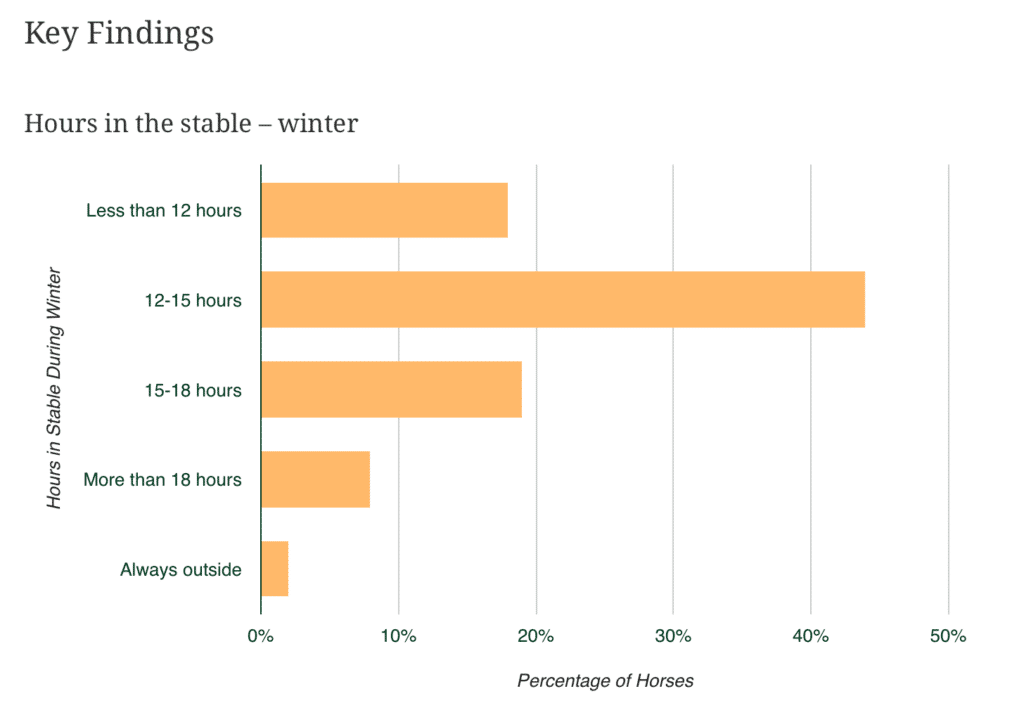
UK Confirms Equine Respiratory Disease remains #1 Problem
Bedmax a pine wood fiber horse bedding company in the UK – confirms in a new survey that equine respiratory disease remains a significant problem.
Health: Equine respiratory disease remains a significant health problem for UK owners.
Hygiene: was also a key priority in respondents’ choice of bedding, underlining growing concerns over biosecurity in stables where most horses spend at least half their lives. Over 70% of owners confirmed that in the winter months, they keep their horses in the stable for a minimum of twelve hours out of every twenty-four.
Dust: Respondents confirmed overwhelmingly that safeguarding their horse’s health is paramount when choosing bedding, and their priority is choosing one with the lowest airborne dust levels.
Loss of use was also significant, as over 55% of owners experiencing equine health problems said that their horses were on box rest and/or could not be ridden for more than a month.
USE OF BEDDING MATERIAL
48% of respondents use purpose-made wood shavings. 10% use straw, 8% wood pellets and 4% straw pellets.
22% cited ‘Other’ specifying the use of mixed beds, many with shavings on top of wood or straw pellets or loose straw.
Thanks to Everything Horse for publishing the article.
Data from the recent Bedmax National Equine Health Survey has identified that equine respiratory disease remains a significant health problem for UK owners. The report highlighted that more than 45% of the 993 owners who completed the survey had horses that had suffered a health problem (as opposed to an injury) that required box rest and/or veterinary treatment.
Respondents: 993
- The results are taken from 993 UK horse owners who responded to the survey.
- 45% of the respondents kept their horses at home; 45% at DIY livery.
- For more than 50%, leisure riding is the principal activity, with eventing, dressage and show jumping the most popular forms of competition.
Horses: 2305 +
- Approximately 70% of respondents own or are responsible for the care of more than 1 horse, and 22% for more than 3.
- The minimum total number of horses owned or cared for by the respondents is therefore 2,305.
- The maximum number is likely to be over 3,000.
Hygiene was a key priority in respondents’ choice of bedding, underlining growing concerns over biosecurity in stables where most horses spend at least half their lives. Over 70% of owners confirmed that in the winter months they keep their horses in the stable for a minimum of twelve hours out of every twenty-four.
Equine health problems
Most Common Equine Health Issues
The survey found that 90% of horses are either kept at home or at DIY Livery, with leisure riding the most popular equine activity. Overall, the top equine health problems suffered were:
- 30% Respiratory ill health
- 21% Laminitis
- 20% Arthriti
- 12% Mud fever
- 10% Hoof disease, cracking, infection

Respiratory ailments remain the most prevalent equine health problem and at Bedmax we make our shavings from fresh pine, which offers unique antibacterial action against harmful bacteria and fungi. We also dry our shavings at sterilizing temperatures and vacuum extract every particle of airborne dust we can during production, to help avoid this very problem.

Time required for recovery
Of those horses which had suffered any health problems during the winter months,
- 42% required box rest for between one and two weeks,
- 26% required 1-2 months box rest
- 14% 2-3 months box rests.
- 18% required more than 3 months.
Veterinary costs
Under £500£2000+£1500-£2000£1000-£1500£500-£1000
| Cost | Number of People |
|---|---|
| £2000+ | 117 |
| £1500-£2000 | 34 |
| £1000-£1500 | 61 |
| £500-£1000 | 108 |
| Under £500 | 200 |
We asked respondents to indicate their costs of veterinary treatment for health problems. Of the 520 owners responding to the request to indicate their veterinary costs for treating health problems, more than 40% paid over £1,000 for treatment; 22% paid over £2,000.

Type of bedding used
48% of respondents use purpose-made shavings like Bedmax. 10% use straw, 8% wood pellets and 4% straw pellets. 22% cited ‘Other’ specifying the use of mixed beds, many with shavings on top of wood or straw pellets or loose straw.
Environmental concerns
We also surveyed attitudes to the environment, specifically to the importance of their suppliers’ environmental credibility, and to their own methods of disposing of used bedding. Almost all respondents told us they or their stables compost their waste bedding and make it available to farmers or gardeners.
If not properly treated and managed there can be long term effects on the lungs that can reduce life expectancy in some horses. Apart from equine fluand the herpes virus, the most common respiratory problems are multifactorial, but the inhalation of airborne particles and the irritation to the mucosal lining of the respiratory tract is one very common factor.”
Respondents confirmed overwhelmingly that safeguarding their horse’s health is paramount when choosing their bedding, and their priority is choosing one with the lowest airborne dust levels.
